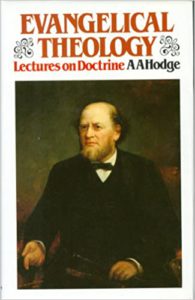
The expiatory work of Christ which is sufficient for, adapted to and freely offered to all men, being presupposed, the question of questions is, How, by what agencies and on what conditions, is it effectually applied to any individual? The Scriptures make it plain that the condition of its effectual application is an act of faith, involving real spiritual repentance and the turning from sin and the acceptance and selfappropriation of Christ and of his redemption as the only remedy. But what will prompt a sinner in love with his sin, spiritually blind and callous, thus to repent and accept Christ as the cure of the sin he loves? The first movement cannot begin with man. The sinner of himself cannot really desire deliverance from sin; of himself he cannot appreciate the attractive beauty, loveliness or saving power of Christ. The dead man cannot spontaneously originate his own quickening, nor the creature his own creating, nor the infant his own begetting. Whatever man may do after regeneration, the first quickening of the dead must originate in the first instance with God. All Christians feel this as the most intimate conviction of their souls. Yet it involves necessarily this very doctrine of eternal predestination or election. If God begins the work, if our believing follows his quickening, then it is God, not man, who makes the difference between the quickened and the unquickened. If we believe, it is because we have been first quickened. If any man does not believe, it is because he is yet dead in his natural sin. God’s eternal choice therefore cannot depend upon foreseen faith, but, on the contrary, faith must depend upon God’s eternal choice.
As between the man who believes in Christ and the man who finally rejects him, the source of the difference is put by the Pelagian entirely in the inalienable, unassisted power of the human will. All that can be said in the case is that the one man has accepted Christ because he chose to do so, and the other man has rejected Christ because he chose to do so. Each has acted as he has done in the unfettered and unfetterable exercise of the human will. But Pelagianism makes no room for original sin nor for the necessity of divine grace. It is diametrically opposed to the Scriptures, to the religious experience of all Christians, and it has been rejected as anti-Christian by the unanimous consent of the whole historic Church.
The Semi-Pelagian, admitting that man is morally sick, holds that every sinner must make the first movement God-ward spontaneously, in his own strength, after which, if his effort is sincere, however ineffectual, God will co-operate by his grace with him and make his effort successful. The Arminian, on the other hand, admitting that all men, being dead in trespasses and sins, are absolutely incapable of spontaneously originating any good desire or effort, yet holds that God gives the same sufficient grace to all men; and he makes the difference between the believer and the unbeliever to lie in the fact that the former co-operates, and thus renders the grace in his case effectual, and the other fails to co-operate with it, and thus renders it ineffectual. The Lutheran, who maintains that men are in such sense dead in sin that they are utterly unable to co-operate with grace before they have been themselves quickened to life by grace, yet makes the difference between the believer and the unbeliever to consist in the fact, that while no man can cooperate with grace previous to regeneration, every man is free to resist it. With the Lutheran, therefore, the believer is the non-resistant, the unbeliever is the resistant, subject of a common universal grace. The Calvinist, on the other hand, glorifies the free and sovereign grace of God by attributing to it alone all the efficiency in saving the believing sinner. It is God’s grace which makes the believer all he is. He feels this; of this at least he is absolutely sure. He is nothing more than a poor wandering sheep. The Good Shepherd has sought him out, found him and carried him back on his breast. In himself and of himself in his entire history he is no better than his fellow-men who are lost. It is only God’s free grace, therefore, which has made the difference. The faith he has cannot have been the precondition of God’s choice, but God’s choice must have been the precedent cause of his faith.
In this form of the doctrine, we did not first choose him, but he first chose us. This truth enters into all genuine Christian experience. It is of the essence of the universal Christian sentiment. It finds its expression in the sacred hymns and in the prayers of our fellow-Christians who call themselves Arminians, as it does in the prayers and hymns of those commonly styled Calvinists. All alike wrestle in prayer as if God’s grace determined the decision. All alike cry, “Make them willing, Ο God, in the day of thy power!” It is the common confession of all alike that it is God who in all things works in us to do, by “working in us to will, of his good pleasure.” All alike ascribe to him the prerogative of turning the hearts of men even as rivers of water are turned. All Christians with one voice cry, “Not unto us, Ο Lord, not unto us, but unto thy name give glory, for thy mercy and for thy truth’s sake.” In the theology of the heart all Christians are Calvinists; that is, all Christians ascribe all their salvation unto God. And this is the only form in which the doctrine of sovereign predestination should be insisted upon as of vital religious interest.
Source
A.A. Hodge, Evangelical Theology: Lectures on Doctrine (Banner of Truth, 1976), pp. 120-123. First published in 1890.
Related Post: Sovereign Grace, Regeneration and Humble Calvinism